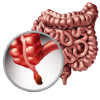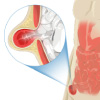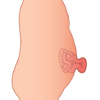
Select City
Laparoscopy is an effective procedure to treat certain conditions such as:
This procedure is also known as keyhole surgery due to the minute nature of incisions involved. The surgeon uses a long, thin instrument called a laparoscope which is attached to a high-resolution camera on the other end. The camera provides live images of the organs and tissues in the abdomen. The surgeon locates the epicenter of the disease via an external monitor and operates with high precision.
Laparoscopic surgeons refer to a category of specialists who have years of practice in performing laparoscopic surgeries. These surgeons are also called general surgeons who use minimally invasive techniques for performing the surgery. Laparoscopy requires precision to operate on sensitive areas of the abdomen without having full access to the organs, unlike open surgery.

Protrusion of internal organs into abdominal muscle wall ...

Hardened deposits of bile in the gallbladder ...

Inflammation, swelling, or infection in the appendix ...

Protrusion of tissues through the inguinal canal ...

Intestine bulging through an opening near the navel ...

Surgery to remove infected appendix ...
Choose Your City
It help us to find the best doctors near you.
Ahmedabad
Bangalore
Bhubaneswar
Chandigarh
Chennai
Coimbatore
Delhi
Hyderabad
Indore
Jaipur
Kochi
Kolkata
Kozhikode
Lucknow
Madurai
Mumbai
Patna
Pune
Raipur
Ranchi
Thiruvananthapuram
Vijayawada
Visakhapatnam
Delhi
Hyderabad
Pune
Mumbai
Bangalore
Pradeep Singh K
Recommends
Surgery was smooth, recovery was quick, and the staff was very caring. Very satisfied.
Ranjitha
Recommends
Procedure was safe, healing is going well, and overall experience was excellent.
Nutan
Recommends
Dr Ranjith is very knowledgeable and patient enough to answer any questions asked. Very camly he clears all the doubts and will in hurry or rush.
Vijay Wadnere
Recommends
Hernia operation went well, pain is reducing , and hospital experience was good.
Manave agarwal
Recommends
I received the best treatment, doctor is very helpful.
Delivering Seamless Surgical Experience in India
Pristyn Care provides consultation for 50+ diseases and treatments such as Piles, Hernia, Kidney Stones, Cataract, Gynecomastia, Abortion, IVF, etc. across 30+ major cities in India.
Our surgeons spend a lot of time with you to diagnose your condition. You are assisted in all pre-surgery medical diagnostics. We offer advanced laser and laparoscopic surgical treatment. Our procedures are USFDA approved.
A dedicated Care Coordinator assists you throughout the surgery journey from insurance paperwork, to free commute from home to hospital & back and admission-discharge process at the hospital.
We offer free follow-up consultations and instructions including dietary tips as well as exercises to every patient to ensure they have a smooth recovery to their daily routines.
Pristyn Care in News





Top Cities Where We Provide Laparoscopy Treatment
Depending on the type of laparoscopic procedure, the patient is given pre-surgery instructions by the hospital or surgeon. The patient must not consume any food or fluid 8 to 9 hours prior to the surgery. It is also advised to wear loose clothing so that the clothes do not cause discomfort to the surgical site. Here is what you can expect during and after the laparoscopic surgery –
Laparoscopic surgery is a major surgery that requires adequate rest and post-surgery restrictions to reduce complications and offer smooth recovery. Some of the do’s and don’ts after laparoscopic surgery are as follows –
The recovery time can differ depending on the medical condition of the patient and the type of laparoscopic surgery. The patient usually takes around one to two weeks to fully recover after the surgery. Here is what you can expect after your laparoscopic surgery at home –
Pristyn Care is a full-stack healthcare institute associated with some of the best multi-specialty hospitals and healthcare institutions across India. We aim to ease the process of accessing laparoscopic surgeries for every individual at minimal costs. Our general surgeons and specialists have years of experience in laparoscopy with a success rate of over 90%. Advantages of choosing Pristyn Care are –
Get in Touch
Tell us about your problems and we'll figure out the best treatment option for you.
Pristyn Care services are accessible Pan India

.svg)